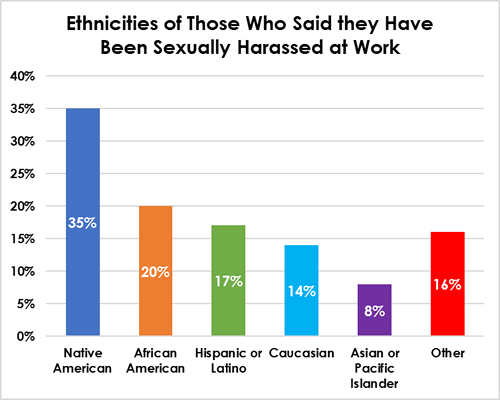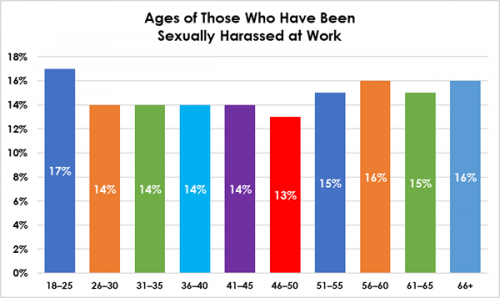
Sexual harassment in the workplace can cost employers millions of dollars each year due to diminished productivity, costly litigation, and reduced morale. It’s critical for employers to not only educate employees on the different types of harassment in the workplace, but to also communicate and cultivate a zero-tolerance culture. Sexual harassment affects businesses of all sizes and employees from all walks of life.
A recent survey by Comparably asked one simple question: “Have you ever been sexually harassed at work?” Over 10,000 people answered from all different backgrounds. Using the data collected, the survey gives a glimpse into who is most commonly sexually harassed at work. Though it’s not an official research study by any means, the resulting information is helpful to employers who are looking to create more efficient anti-harassment policies.
According to the survey, 8% of males answered yes to having been sexually harassed at their workplace. 26% of females also answered yes, which is right in line with findings from the United States Equal Employment Opportunity Commission (EEOC), who estimate that 1 in 4 women have experienced some form of undefined “sexual harassment” in the workplace.
The survey then categorized answers utilizing the profile information offered by users, including ethnicity, age, education, experience, and location. Here is a look at some of the numbers that resulted from the survey:
Ethnicity: At 35%, Native American respondents had the highest incidence of sexual harassment in the workplace compared to other ethnicities, followed by African Americans at 20% and Latinx at 17%. Caucasian workers had the second lowest percentage at 14%, slightly above the 8% of Asian/Pacific Islander workers to answer yes.

Age: The survey found that the highest number of respondents who answered yes were employees between 18 and 25 years old at 17%. Just below that were workers on the complete opposite end of the age spectrum, with 56-60 and 66+ at 16%. The lowest percentage was in the 46-50 age range, at 13%.

Education: Respondents who answered yes the most (21%) were those with a high school education, followed by those with Associate degrees at 20% – nearly double that of employees with Bachelor’s or Master’s degrees. (12% for both.)

The most staggering differences in experiences were from the different ethnicity groups, and of course genders. Age seemed to be the least dividing category, suggesting that workers of all ages are very similarly affected by sexual harassment.
To help prevent sexual harassment from occurring the workplace, employers should create policies that clearly state what constitutes prohibited behavior, including both physical and non-physical offenses. Behaviors such as propositions, derogatory comments or jokes, and obscene language or gestures should be specifically outlined as examples of harassment in the employee handbook.
With minorities at a higher risk of being sexually harassed, it seems apparent that investing in diversity and inclusion (D&I) programs is another way employers can foster a better workplace culture and discourage harassment, yet according to research done by Glassdoor, only 35% of hiring decision-makers expect to increase investment in diversity and inclusion efforts. 59% of hiring decision makers reported that a lack of investment in D&I is a barrier or challenge their organization faces in attracting and hiring quality candidates.
In an era of informed candidates, job seekers are actively looking for insights into what potential employers are doing to build a more diverse workplace with zero-tolerance for harassment. Simply making an effort can help sway potential employees. Employers should meet with Human Resources to create detailed D&I and anti-harassment policies, and work with their Recruiting Consultant to publicize those policies so that the ideal candidates can find them.
Emplicity understands that HR Outsourcing should be simple and meaningful. As a Professional Employer Organization (PEO), we strive to be a great partner in supporting your business. If you would like to request more information on how we can assist your needs, please reach out to us at 877-476-2339. We are located in California – Orange County, Los Angeles, and the greater Sacramento and San Francisco area.
NOTICE: Emplicity provides HR advice and recommendations. Information provided by Emplicity is not intended as a substitute for employment law counsel. At no time will Emplicity have the authority or right to make decisions on behalf of their clients.

